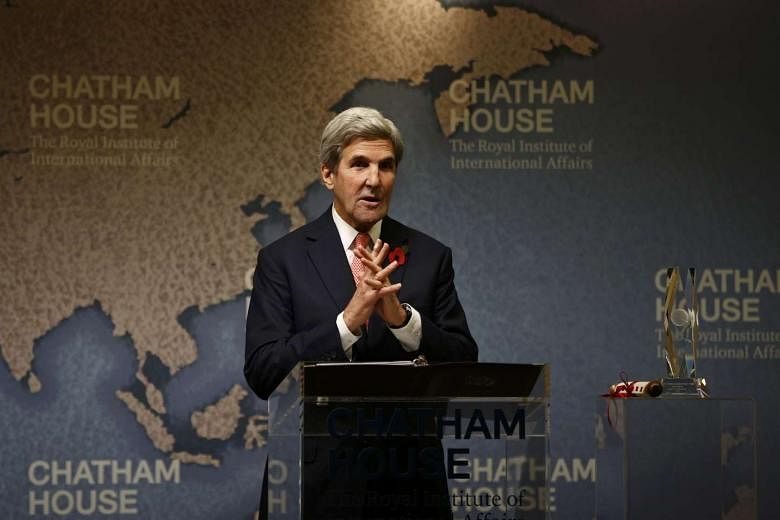BERLIN (AFP) - US Secretary of State John Kerry kicked off a European farewell tour on Monday, six weeks before the inauguration of President-elect Donald Trump whose shock victory has deeply unsettled the continent.
The top American diplomat is visiting Germany and Brussels, seat of the EU and NATO, to stress the importance of transatlantic ties before he and the rest of President Barack Obama's administration hand over to the Trump team on January 20.
Trump has vowed to rip up key diplomatic achievements reached under Kerry - from the Iran nuclear deal to a trans-Pacific trade pact - and was this week looking for a successor at the helm of the State Department.
Kerry started his trip in Berlin, where he and his German counterpart Frank-Walter Steinmeier discussed ongoing crises, from Syria to Ukraine, as well as upcoming NATO and OSCE meetings.
Kerry also received the German Cross of Merit from Steinmeier, for their close cooperation in areas from climate change to countering the Islamic State group.
While Steinmeier said Kerry "embodies the best of America", the US secretary of state recalled his childhood years in post-war 1950s Berlin and said the transatlantic alliance remains "at the forefront of global progress".
From Tuesday in Brussels, Kerry joins a NATO foreign ministers' meeting which, a US diplomat said, aims to help "strengthen NATO's security, to project stability to the alliance's east and south, and to strengthen NATO-EU cooperation".
Yet partners will also seek clarity after Trump has suggested Washington might think twice about coming to the rescue of a NATO ally under threat if it had not paid its dues to the alliance.
On Wednesday, Kerry will travel to the northern German city of Hamburg for a foreign ministers' meeting of the 57-member Organization for Security and Cooperation in Europe (OSCE), hosted by Steinmeier.
Also in Hamburg will be Russian Foreign Minister Sergei Lavrov, Kerry's counterpart amid tensions over the Ukraine conflict and the Syrian war, where Moscow backs the regime of President Bashar al-Assad.
A State Department official said Kerry "will emphasise the need for all 57 (member states) to uphold and implement OSCE principles and commitments, including on human rights and military security".
Meanwhile, back in the United States, Trump's team was searching for a candidate to replace Kerry, as the president-elect has been firing off diplomatic broadsides on Twitter, including one accusing China of military expansionism and currency manipulation.
Whoever becomes the nominee to succeed Kerry, said Trump's senior aide Kellyanne Conway, must be ready to "implement and adhere to the president-elect's America First foreign policy, if you will, his view of the world".
Kerry at the weekend said he was "working to stay a thousand miles away from the Trump transition and the process".
Asked whether the Trump team had sought State Department input so far as it has made contact with foreign leaders, Kerry said "we have not been contacted before any of these conversations".
In Europe, some fear the worst if Trump, as promised, steers the superpower toward an isolationist nationalism.
Germany's former foreign minister Joschka Fischer wrote on Monday that "Europe is far too weak and divided to stand in for the US strategically, and, without US leadership, the West cannot survive".
"Thus, the Western world as virtually everyone alive today has known it will almost certainly perish before our eyes." Kerry in his Berlin speech said for seven decades "our alliance has helped move this continent and our planet toward greater peace, security, and freedom".
This had been true "regardless of partisan political affiliations" on either side "and that cannot, and must never, change".
Steinmeier, in his speech, briefly switched into English to direct a message to the Trump team: "We want to sit down and have a conversation. It's important, and it's urgent."

